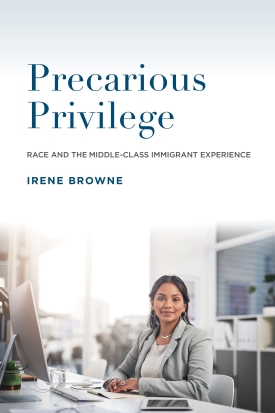
Precarious Privilege
About This Book
“As the Latino population has grown in the United States, it has been racialized along the lines of legality and nationality, compelling middle-class Latinos who ‘look Hispanic’ constantly to have to identify themselves as not being undocumented, unskilled Mexican migrants. This dynamic plays out differently in different regions of the country, depending on the local history of immigration and the actual ethnic and class origins of the region’s Latinos. Irene Browne’s probing analysis of college-educated Dominicans and Mexicans in greater Atlanta is brilliant in revealing the dilemmas, complexities, and burdens that prevailing U.S. stereotypes create for middle-class Latinos of Afro-Caribbean and mestizo origin, especially within a region historically characterized by a rigid Black-White color line. Precarious Privilege reminds us of the need to always look beyond the narrow confines of stigmatized ethnoracial labels to see the true nature of the individuals they purport to describe.”
—DOUGLAS S. MASSEY, Henry G. Bryant Professor of Sociology and Public Affairs, Princeton University
“Since 2005, southern states have been plagued by rising anti-immigrant sentiment and immigration policy restrictionism, racializing the experiences of all Latines as ‘poor,’ ‘undocumented,’ and ‘Mexican.’ In this compelling book, sociologist Irene Browne takes us deep into the lives of middle-class and professional Mexican and Dominican immigrants in Atlanta, Georgia, who simultaneously experience but also marshal class-based identities and resources to resist such stigmatization and prove their worth. Absolutely essential reading for anyone interested in better understanding the U.S. Latine population’s remarkable internal diversity today.”
—HELEN B. MARROW, associate professor of sociology, Tufts University
In recent years crackdowns on immigrant labor and a shrinking job market in California, Arizona, and Texas have pushed Latine immigrants to new destinations, particularly places in the American South. Although many of these immigrants work in manufacturing or food-processing plants, a growing number belong to the professional middle class. These professionals find that despite their privileged social class and regardless of their national origin, many non-Latines assume that they are undocumented working-class Mexicans, the stereotype of the “typical Latine.” In Precarious Privilege, sociologist Irene Browne focuses on how first-generation middle-class Mexican and Dominican immigrants in Atlanta respond to this stigmatizing assumption.
Browne finds that when asked to identify themselves by race, these immigrants either reject racial identities entirely or draw on belief systems from Mexico and the Dominican Republic that emphasize European-indigenous mixed race identities. When branded as typical Latines in the U.S., Mexican middle-class immigrants emphasize their social class or explain that a typical Latine can be middle-class, while Dominicans simply indicate that they are not Mexican. Rather than blame systemic racism, both Mexican and Dominican middle-class immigrants often attribute misperceptions of their identity to non-Latines’ ignorance or to individual Latines’ lack of effort in trying to assimilate.
But these middle-class Latine immigrants do not simply seek to position themselves on par with the U.S.-born white middle class. Instead, they leverage their cosmopolitanism—for example, their multilingualism or their children’s experiences traveling abroad—to engage in what Browne calls “one-up assimilation,” a strategy that aims to position them above the white middle class, who are often monolingual and unaware of the world outside the United States. Middle-class Latines’ cosmopolitanism and valuing of diversity also lead them to have cordial relations with African Americans, but these immigrants do not see themselves as sharing African Americans’ status as oppressed minorities.
Although the stereotype of the typical Latine has made middle-class Latine immigrants susceptible to stigma, they insist that this stigma does not play a significant role in their lives. In many cases, they view the stereotype as a minor issue, feel that opportunities for upward mobility outweigh any negative experiences, or downplay racism by emphasizing their class privilege. Browne observes that while downplaying racism may help middle-class Latine immigrants maintain their dignity, it also perpetuates inequality by reinforcing the lower status of working-class undocumented immigrants. It is thus imperative, Browne argues, to repeal harsh anti-immigration policies, a move that will not only ease the lives of the undocumented but also send a message about who belongs in the country.
Offering a nuanced exploration of how race, social class, and immigration status intersect, Precarious Privilege provides a complex portrait of middle-class Latine immigrants in the United States today.
IRENE BROWNE is associate professor of sociology at Emory University.
